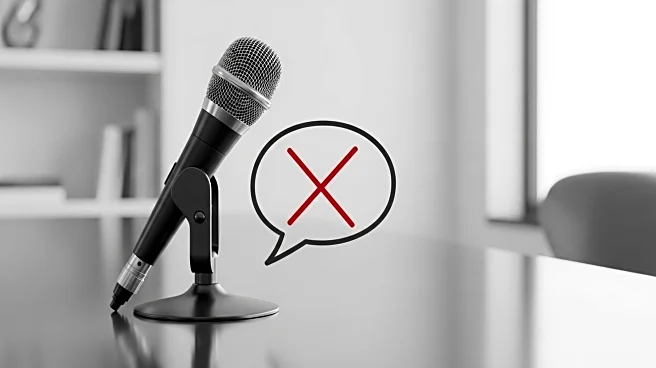What's Happening?
Kate Mason, PhD, a former world champion debater and communications expert, has identified several 'minimizing' phrases that professionals, particularly women, often use in the workplace. Mason, who founded the strategic communications firm Hedgehog + Fox, notes that these phrases can undermine one's authority and credibility. Her insights are detailed in her book 'Powerfully Likeable: A Woman's Guide to Effective Communication.' Mason emphasizes that phrases like 'It'll just take a second,' 'No worries if not,' and 'I'm not an expert, but...' can have negative impacts on professional interactions. These expressions often stem from a desire to be considerate or self-consciousness about one's status, but they can inadvertently diminish the perceived importance of one's message or request.
Why It's Important?
The use of minimizing language in professional settings can have significant implications for career advancement and workplace dynamics. By inadvertently downplaying their contributions, professionals may miss opportunities to assert their expertise and influence. This is particularly relevant for women, who may face additional challenges in asserting themselves in male-dominated environments. Mason's advice encourages individuals to communicate with confidence and clarity, which can lead to better recognition of their work and ideas. This shift in communication style can empower professionals to more effectively advocate for themselves and their projects, potentially leading to greater career success and satisfaction.
What's Next?
Professionals seeking to improve their communication skills may consider adopting Mason's recommendations to avoid minimizing language. This involves reframing requests and statements to emphasize their importance and urgency. For instance, instead of saying 'It'll just take a second,' one might schedule a dedicated time to discuss important matters. Additionally, Mason suggests specifying the purpose and timeframe of requests to ensure clarity and priority. As more individuals become aware of these communication pitfalls, workplaces may see a shift towards more assertive and effective communication, fostering environments where contributions are valued and recognized.
Beyond the Headlines
The implications of Mason's insights extend beyond individual communication strategies to broader workplace culture. By addressing the tendency to use minimizing language, organizations can foster a culture of empowerment and respect. This can lead to more inclusive environments where diverse voices are heard and valued. Furthermore, as professionals become more aware of the impact of their language, they may contribute to a shift in societal norms around communication, promoting greater equity and understanding in professional and personal interactions.









